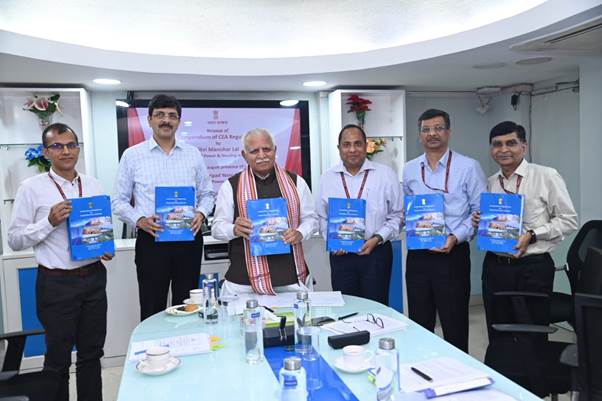Union Minister Shri Manohar Lal Launches Compendium of CEA Regulations under the Electricity Act, 2003
Union Minister Shri Manohar Lal Launches Compendium of CEA Regulations under the Electricity Act, 2003
The Union Minister of Power and Minister for Housing and Urban Affairs, Shri Manohar Lal, today launched a comprehensive compendium of regulations notified by the Central Electricity Authority (CEA) under the Electricity Act, 2003. The launch event, held in New Delhi, marks a significant milestone in the ongoing efforts to create a reliable, efficient, and sustainable electricity sector in India.
The CEA regulations provide a robust framework for the generation, transmission, distribution, and trading of electricity across the country. These regulations are crucial in ensuring grid stability, promoting efficient resource use, maintaining safety standards in electricity operations, and facilitating the integration of renewable energy into the national grid. The compendium covers a wide range of topics, including technical standards, safety measures, grid connectivity, and more, reflecting the evolving needs of India’s power sector.

At the launch, Union Minister Shri Manohar Lal stated, “The release of this compendium of CEA regulations is a crucial step towards ensuring transparency in the power sector in India. The regulations encapsulated in this compendium will bring uniformity of rules and will provide a centralised and easily accessible source of information at one place for ease of compliances by the power sector stakeholders.”
Key Highlights of the CEA Regulations Compendium:
The compendium is a vital resource for all stakeholders in the power sector, including policymakers, developers, and operators, offering a consolidated reference to ensure compliance with the highest standards in electricity generation, transmission, and distribution.
- Grid Standards:
Establishes a framework governing the operation and maintenance of the electricity grid, including standards for voltage, frequency, and system security, as well as the integration of diverse energy sources. - Technical Standards for Grid Connectivity:
Sets technical requirements for connecting generating stations, including renewable energy sources, to the grid, ensuring stability and smooth integration of renewable energy. - Safety and Electric Supply Measures:
Provides guidelines to ensure the safety of public, workers, and equipment during the generation, transmission, and distribution of electricity. It also includes additional safety requirements for electric vehicle charging stations. - Safety Requirements for Construction, Operation, and Maintenance of Electrical Plants and Lines:
Establishes safety standards to prevent accidents and ensure the safe operation of electrical installations, including recent amendments mandating safety audits and the setup of early warning systems for hydro projects. - Flexible Operation of Coal-Based Thermal Power Generating Units:
Ensures that coal-based power plants can operate flexibly, with a minimum power level of 40%, supporting the grid as the energy mix shifts towards renewable sources. - Installation and Operation of Meters:
Standardizes metering practices to ensure accurate billing, enhance reliability, and promote transparency in the electricity sector. - Furnishing of Statistics, Returns, and Information:
Mandates the submission of data related to electricity generation, transmission, and distribution to enable the CEA to monitor and analyze the power sector’s performance. - Technical Standards for Communication Systems in Power Sector:
Sets standards for communication systems, enhancing the operational efficiency of the power grid through improved data transfer and real-time monitoring. - Technical Standards for Construction of Electrical Plants and Electric Lines:
Specifies standards for designing, constructing, and maintaining electrical plants and lines, ensuring safety, reliability, and efficiency.